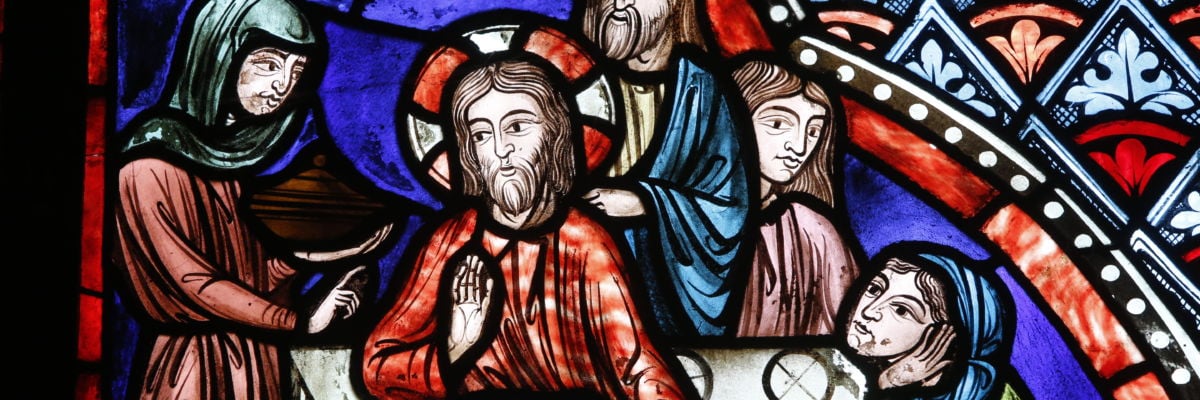
Now as they went on their way, he entered a village; and a woman named Martha received him into her house. And she had a sister called Mary, who sat at the Lord’s feet and listened to his teaching. But Martha was distracted with much serving; and she went to him and said, “Lord, do you not care that my sister has left me to serve alone? Tell her then to help me.” But the Lord answered her, “Martha, Martha, you are anxious and troubled about many things; one thing is needful. Mary has chosen the good portion, which shall not be taken away from her” (Luke 10:38-42).
I am a Martha. And proudly so! I love to work and, most importantly, serve as a laborer in the Lord’s vineyard. Previously having a fifteen-year career in the Church, I now serve as a volunteer at my parish by teaching marriage prep with my husband, leading story time at Vacation Bible School, and cultivating a family ministry for young parents. Despite not being paid for these roles, I view them just as seriously and with as much commitment as a formal job description. It’s the Martha in me. Give me a task, and I get it done.
However, the Lord said that Mary chose the better part, not Martha. Rather than being distracted by tasks, Mary chose to sit at Jesus’ feet and listen.
St. Gregory the Great wrote, “For what is set forth by Mary, who sitting down gave ear to the words of our Lord, save the life of contemplation? And what by Martha, so busied with outward services, save the life of action? Now Martha’s concern is not reproved, but that of Mary is even commended.” He then arrived at this vital conclusion: “For the merits of the active life are great, but of the contemplative, far better.”
I have never viewed the story of Martha and Mary as a condemnation of my personality and giftings. Rather, it is a lesson that teaches me how to channel my desires to work and serve and from whom I receive the grace to activate these gifts. I find great fulfillment in completing a task and seeing the good fruit stemming from it. Many of us garner satisfaction and a sense of achievement from a completed project, especially when we are credited for our efforts. How many contemplatives are praised by modern-day society? Not many. It’s the activists, the leaders, and the doers of the world who most often receive the accolades.
However, one of the greatest change agents of the twentieth century was also a deep contemplative: St. Mother Teresa of Calcutta. It still shocks me to this day that she spent two hours daily in eucharistic adoration. And yet she was able to accomplish so much good for the Church and the world and was publicly recognized for it, most notably winning a Nobel Peace Prize. This great modern saint was certainly both a Martha and a Mary.
I have been privileged to spend considerable time with religious sisters in the United States. These consecrated women have been shining witnesses to living like Mary by sitting and listening to the Lord during their daily commitments to prayer. They just as strongly witness to life as a Martha by working to the bone in the service of others—women like the Hawthorne Dominicans, who care for the poor dying of cancer; the Sisters of Life, who live alongside women in crisis pregnancies; and the Hospitaler Sisters of Mercy, who run a rehabilitation home for victims of human-trafficking.
Anyone who exhibits peace beyond understanding and joy in the midst of suffering is undoubtedly a Christ-follower and has converted her heart to Christ through a personal relationship. Relationships are built upon undivided, quality time with the other person. Jesus said the better part “will not be taken away from her,” and so what is most stunning about these consecrated women is their deep and everlasting joy.
When Martha was working, she was not fully present with the Lord, allowing him to guide her in the use of her talents. In busy family life, it can be difficult for the laity to look at the lives of the saints and imagine fitting in a holy hour, let alone two! However, a recent event in my own Catholic community led me to believe that I’m surrounded by Marys who have chosen the better part.
A family of eight was celebrating their daughter’s birthday at a local ice-skating rink. Many other Catholic families were present for the festivities. The birthday girl collapsed on the ice and had a potentially fatal heart episode. I was not present at the event, but I heard firsthand from witnesses about how the next fifteen minutes played out, before the paramedics arrived. The mother immediately called everyone to gather around to pray the rosary. While little children were crying and deeply disturbed at seeing their friend suffering, the victim’s mother thought of others and calmed everyone down through prayer until the first responders arrived.
I must admit, as a Martha, I was angry when I first pictured this scene. I kept asking questions: Why didn’t the paramedics arrive sooner? Why did no one physically run outside, where there was better cell service, to call the first responders? And why was the mother standing in a prayer circle rather than holding her daughter, as she was most likely dying? I was angry with the other parents for not being doers and thinking on their feet.
Well, I failed to see the bigger picture. That young lady miraculously survived, and I was able to witness her perform on stage just six months later in a rendition of The Sound of Music. I cannot describe how humbling it was to hear her sing the lyrics: “Climb every mountain, search high and low. Follow every byway, every path you know. Climb every mountain, Ford every stream, Follow every rainbow. Till you find your dream.”
Could the prayers of her mother and others present have been exactly the “task” that saved her life and enabled her to follow her dreams? Due to being raised in a contemplative family, could the disposition of her own heart have aided in her remarkable recovery? If the young lady had passed away, would her mother and all those who spent those critical moments in prayer have felt the consolation of the Divine Healer as she transitioned from this life to the next?
I have taken these questions to prayer many times, and considered why I reacted so strongly against those who clearly “chose the better part,” no matter the outcome.
Martha’s personality as an active task manager does not change after Jesus reproaches her. When Jesus returns to Bethany in John Chapter 11, she runs to greet him while Mary stays home. She clearly goes out and actively does something by telling Jesus he has the power to save her brother, Lazarus. But it is also clear that she has had a conversion of heart. This time, she listens to Jesus and shows great faith that his way and his timing are better than hers.
May we all do the same, showing great faith and a willingness to become more like our Savior through a meaningful, personal relationship. St. Martha, pray for us!



